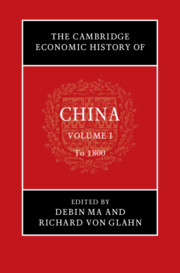Book contents
- The Cambridge Economic History of China
- The Cambridge Economic History of China
- The Cambridge Economic History of China
- Copyright page
- Contents
- Figures
- Maps
- Tables
- Contributors to Volume I
- Acknowledgments
- Note on Citations
- Introduction to Volume I
- Part I Before 1000
- Interlude
- The Tang–Song Transition in Chinese Economic History
- Part II 1000 to 1800
- Bibliography of Primary Works Cited
- Index
- References
The Tang–Song Transition in Chinese Economic History
from Interlude
Published online by Cambridge University Press: 07 February 2022
- The Cambridge Economic History of China
- The Cambridge Economic History of China
- The Cambridge Economic History of China
- Copyright page
- Contents
- Figures
- Maps
- Tables
- Contributors to Volume I
- Acknowledgments
- Note on Citations
- Introduction to Volume I
- Part I Before 1000
- Interlude
- The Tang–Song Transition in Chinese Economic History
- Part II 1000 to 1800
- Bibliography of Primary Works Cited
- Index
- References
Summary
At the turn of the twentieth century, Chinese scholars eager to assimilate the historical sciences of the West and incorporate their history into universal historical narratives readily adopted the tripartite periodization of Western civilization divided into ancient, medieval, and modern epochs. This framework of linear, stadial progression toward modernity offered liberal intellectuals in China the promise of emancipation from China’s stultifying past and rebirth as full citizens in a modern world of equal nation-states. Marxist scholars invoked a parallel tripartite periodization divided into slave, feudal, and capitalist epochs, but adapted to accentuate the defining feature of Chinese history: the rise of a “bureaucratic, centralized feudal state” that fostered “economic stagnation” throughout the longue durée of the imperial era, from the first universal empire of Qin in the third century bce to the irruption of Western imperialism in the nineteenth century.1 The ideas of “oriental stagnation” and the “Asiatic mode of production” likewise inflected Western historiography on China, and the notion of an unchanging “traditional China” prior to the advent of the West in the post-Opium War era predominated in Western scholarship on Chinese history down to the 1970s.
Keywords
- Type
- Chapter
- Information
- The Cambridge Economic History of China , pp. 243 - 256Publisher: Cambridge University PressPrint publication year: 2022
References
Further Reading
- 1
- Cited by

